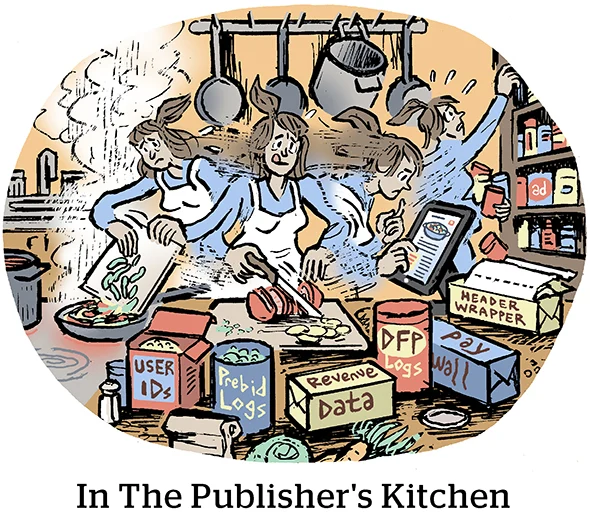Until last year, video was a largely untapped revenue opportunity for Advance Local, a media group that operates local news sites.
It was mostly “on the back burner,” said Grant Whitmore, VP of ad tech and programmatic revenue.
Although the sites under its umbrella, including Syracuse.com, MassLive.com, OregonLive.com and NJ.com, produced a bit of video to accompany their editorial content, they didn’t create or monetize it at scale.
Advance Local also didn’t have a dedicated online video platform partner. Instead, its sites would publish a smattering of video content to their YouTube pages and then manually embed the YouTube player into certain articles.
Then 2023 happened. It was a rough year for digital media, with slowdowns in traffic to online publishers across the board.
“It was a bumpy time for a lot of publishers, and we were looking at things that could help us diversify our revenue portfolio,” Whitmore said. “Video rose to the top.”
An LLM-based approach
Late last year, after meeting with multiple potential online video platform partners, Advance Local chose EX.CO.
EX.CO has a contextual video recommendation system that analyzes the text of an article page and automatically suggests related video content. It took a fairly traditional approach to contextual recommendations, said Tom Pachys, CEO and co-founder of EX.CO.
“We used the text associated with an article and the text that came from the video to do what’s called ‘vectorizing’ and try to find the highest match,” Pachys said, a process that involves converting words into numerical or mathematical representations of their semantic meaning so an algorithm can understand them.
This week, EX.CO released an updated version of its video recommendation engine that also uses LLaMA, Meta’s large language model, to determine the similarities between articles and available video content. The model also considers sentiment, keywords, video length, title, recency and media category.
This approach is faster, but it also produces higher-quality, more relevant recommendations, Pachys said, because the system learns what produces the best engagement and the editorial team can set rules and guidelines.
For example, a publisher might tell the algorithm not to serve a video if the match is below a certain relevance threshold or to avoid including an ad in a video about a sensitive topic.
Easy money
EX.CO’s engine ingests and semantically indexes all of a publisher’s video content, including from social channels, and automatically pulls video from a syndicated library of licensed third-party content if there isn’t a relevant video in the archive.
“We need tools that are as light a lift as possible for the newsrooms, because it would be impractical for us to deploy personnel across all of our markets to frantically and manually select videos to match up with each of the articles we’re producing,” Whitmore said.
But equally as important, Whitmore said, are the monetization capabilities. More video inventory means an opportunity for more pre-roll, mid-roll and post-roll ads.
Video is now a “meaningful” percentage of Advance Local’s overall programmatic revenue, he added, which was not the case in 2023.
“Back then, video revenue came from the pennies YouTube threw to us, so programmatic video revenue quite literally went from zero to seven figures overnight,” Whitmore said. “And we were able to do it without a significant cost investment beyond the hours it took the dev and product folks to get this implemented.”
Don’t hate the player
Not every cohort of visitors is shown video, though.
Although the ad revenue is important, Advance Local is very sensitive to the user experience on its sites.
For example, Advance Local didn’t roll out video for subscribers at first.
“We slow-rolled it with them,” Whitmore said. “We were cautious because these are people who are paying for access to our content, but overall we’ve seen high user acceptance rates for video across all of our sites.”
The player appears under the second paragraph of an article’s text. Videos are autoplay, muted by default, easy to close and move to the side within a floating player when a user scrolls away. This classifies it as “accompanying content” under the IAB Tech Lab’s video ad format guidelines released last year.
When video is present on a page, Whitmore said, visitors spend more time with the content and are more likely to read additional articles during their session.
Advance Local sites have also seen a reduction in what EX.CO calls the negative interaction rate, which is any indication that a user didn’t want the video experience they were served. If someone very quickly x’s out of a video player, for example, it could be because the person wasn’t expecting sound-on autoplay or because the player itself was covering the article.
Overall, negative interactions drop by roughly 40% after publishers implement the new LLM-powered video recommendation engine, according to EX.CO.
“That’s the kind of thing that gives us confidence to move forward with video,” Whitmore said. “It’s been a big initiative for us this year, and it’ll remain one of our most significant initiatives in 2025.”













